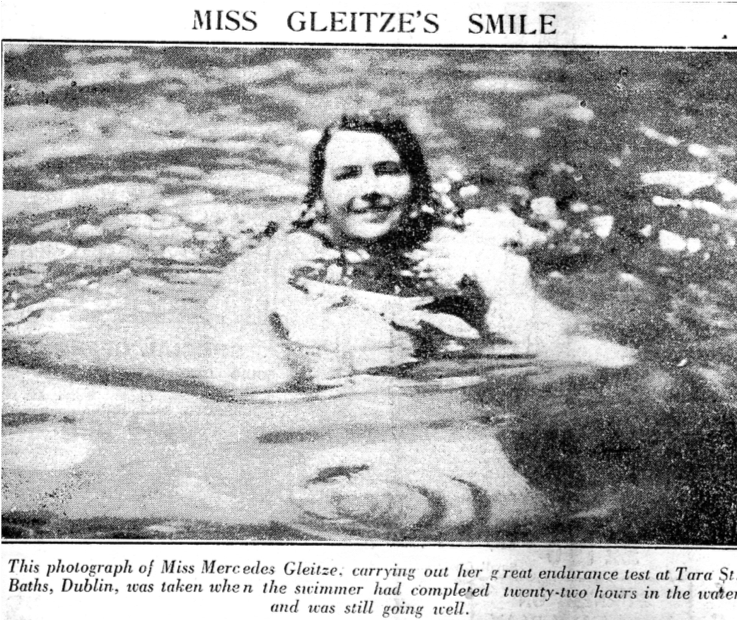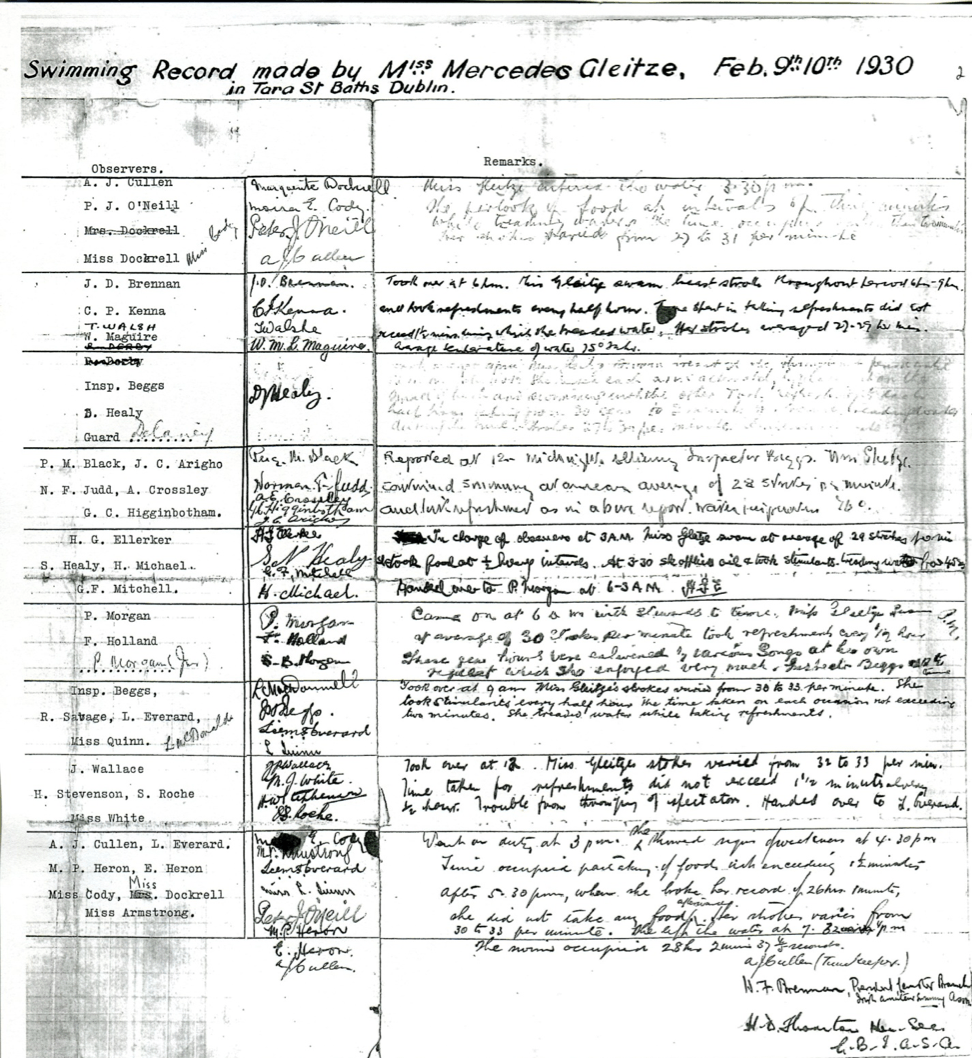Dublin (28 hours) – 9 to 10 February 1930
Tara Street Baths
After the success of the Edinburgh endurance swim Mercedes consolidated her plan to carry out follow-up swims. Winning the British Record for Endurance Swimming greatly pleased her, and she was determined not only to hold on to that title, but also to increase the distance. She still had many open water swims in her sights, but she realised that if she could follow the successful Edinburgh swim with a series of endurance swims around the country, increasing the distance slowly but gradually, this would generate a steady income and would boost the amounts she was able to donate to her charity.
She moved quickly, and received the go-ahead for the next endurance swim from the Dublin Public Health Committee. A letter dated 24 January 1930 reads:
Dear Miss Gleitze,I have now to confirm the arrangement already made with you for your attempt on the British Endurance Record at Tara Street Baths on Sunday, 9th prox., commencing at 3 p.m., on the conditions laid down in your letter to me of the 15th inst., viz:-£5 for accommodation etc. plus free massage for one hour daily during your stay in Dublin for ten days previous to the swim.Fifty per cent of the gross takings at the gate during the swim. I suggest that the admission should be at the rate of one shilling per person.All expenses in connection with the organisation of the swim to be borne by the Dublin Corporation.It must, of course, be understood that this will be entirely at your own risk and that in the remote event of any accident no liability will rest with the Corporation. As I have already notified you, arrangements for massage have been made with the Turkish Baths, St. Stephen’s Green, and when you arrive in Dublin next week I shall give you the necessary letter of introduction to these people.Yours faithfully,M.J. Russell, FRCS DHPMedical Officer of Health.
There was no guarantee that the event would be as successful as the Edinburgh endurance swim, but Mercedes’s hopes were high and she was not disappointed.

Dublin Evening Herald, 10 February 1930
Reproduced courtesy of the National Library of Ireland
There was continuous supervision by observers from the Leinster Branch of the Irish Amateur Swimming Association, who produced a detailed official log of the 28-hour swim.
Nourishment was provided every half hour. Her diet consisted of hot milk, coffee, fruit jellies and lozenges. She occasionally rubbed her hands and arms with olive oil held out to her on a plate, to protect her skin from the chemicals in the water.
Smoking Ban: On Sunday, during the first part of the swim smoking was allowed on poolside, but later that evening it was prohibited by the management, and by morning the atmosphere was clear again – although, owing to the coldness of the weather outside, vapour was rising from the water, which was heated to a temperature of 70 degrees. She experienced one or two bad moments about 2 a.m. and again at 6 a.m., but the lethargy passed. She called for more music, and the gramophone played continuously during the night.
Mercedes finished her swim at 7.30 p.m. on Monday evening, 10th February. She was lifted out of the water by members of the St John Ambulance Brigade amid cheers from the 500 people crammed in the building, and carried to the Superintendent’s office to recover and regain her sense of balance on dry land.
The interest taken in the swim by the general public was, commented one newspaper, ‘surprising’. Right through the duration of the swim there was a steady flow of visitors. Up to midnight on Sunday, 1,750 people had paid for admission and even between the hours of midnight and 6.00 a.m. it attracted three hundred onlookers, with many more to follow during the final day. Many members of theatre audiences as well as dancers looked in before retiring for the night, including several players from the Abbey Theatre. Public interest was constant throughout Monday, and from 4.00 p.m. onwards Tara Street Baths was packed to the doors, hundreds being left outside, and a special Garda force was on duty to keep order on the streets outside.
“The people were simply wonderful”, Mercedes told a reporter from the Dublin Evening Mail (11 February 1930) after the event. “They kept on singing and applauding, and they seemed just as anxious as me that I should succeed.” Through the medium of the press Mercedes also expressed thanks for all that had been done for her by the officials of the Amateur Swimming Association, Mr Patrick Lynch (Superintendent of the Baths), the Baths attendants, members of the St John Ambulance Brigade, the Catholic Boy Scouts and – last but not least – the Garda who, under Inspector Hurley, maintained excellent order with the crowds under difficult conditions.
In the latter part of that same week Mercedes was invited to give a brief talk on her experiences during her record swim to audiences at the Capitol Theatre – three appearances each day over a three day period. She used the opportunity to also express her gratitude for the patronage she had received from the public, and regretted that so many people had been disappointed in not seeing the finishing stages of the endurance test.
The City Commissioners presented a gold bangle to Mercedes to commemorate the swim at a ceremony in City Hall on the following Saturday. The Commissioners said they hoped that her wonderful performance would act as an inspiration to those who had not yet acquired the art of swimming. It was commented that swimming in general had received a big fillip as a result of the Tara Street Baths event. It was a sport which, outside of swimming clubs, has never been properly developed in Dublin.”
Mercedes must have been hugely delighted with the outcome. A total of 4,381 people had filed through the turnstiles of the Tara Street Baths to witness her 28-hours record-breaking swim, and news of her Dublin swim was reported in national and regional newspapers in Britain.
This follow-up event was proof that her ground-breaking endurance swim in Edinburgh was not an accidental success, and that sporting achievement in any discipline – by women as well as men – could move and inspire people from all walks of life.
Copy of the log of the Dublin endurance swim held at Tara Street Baths on 9-10 February 1930:
